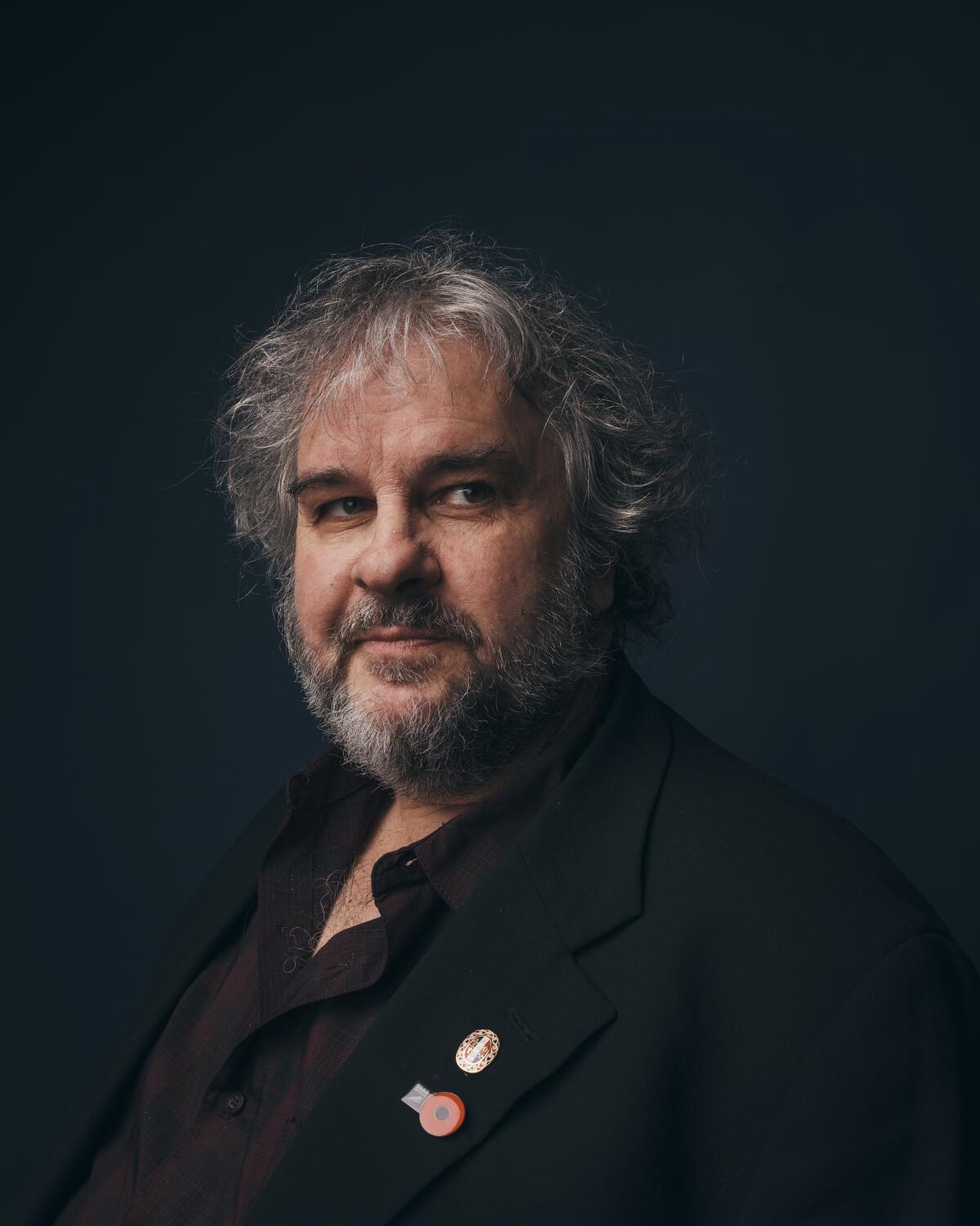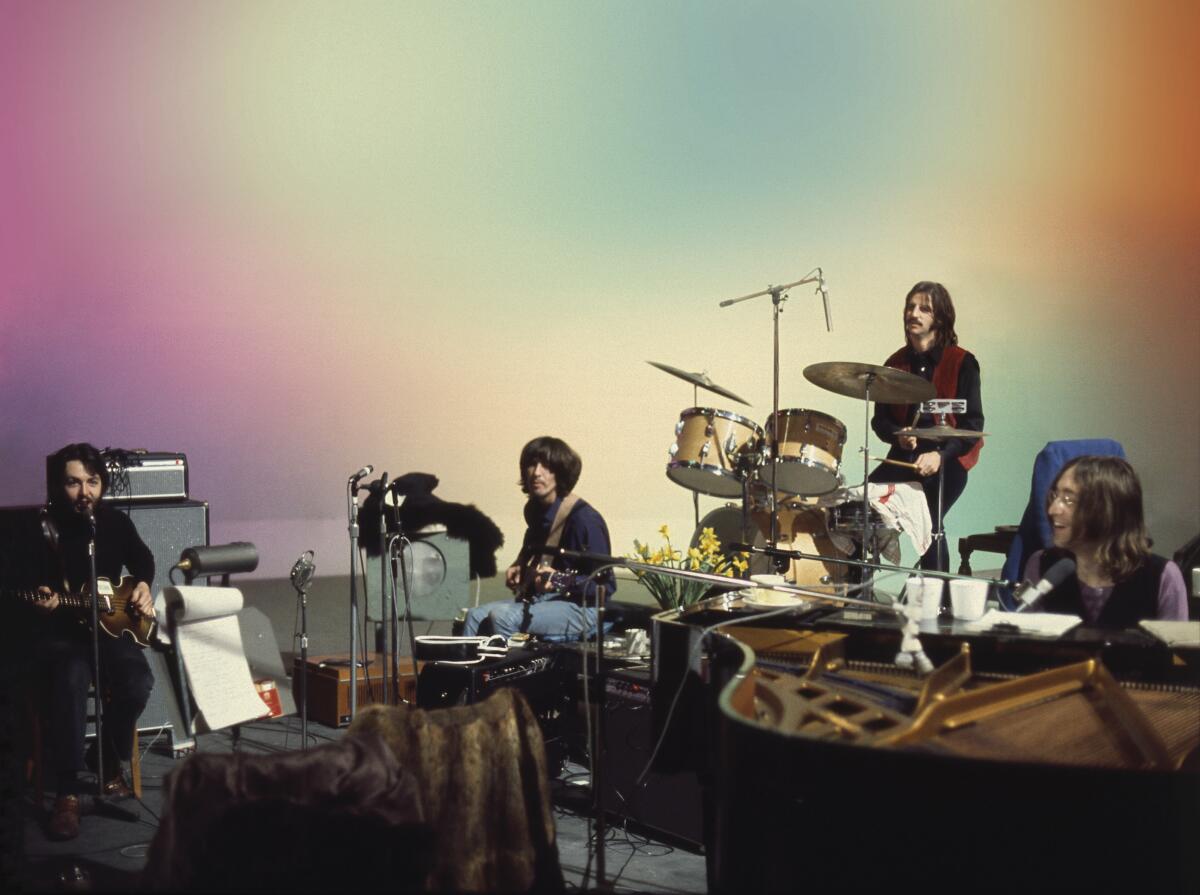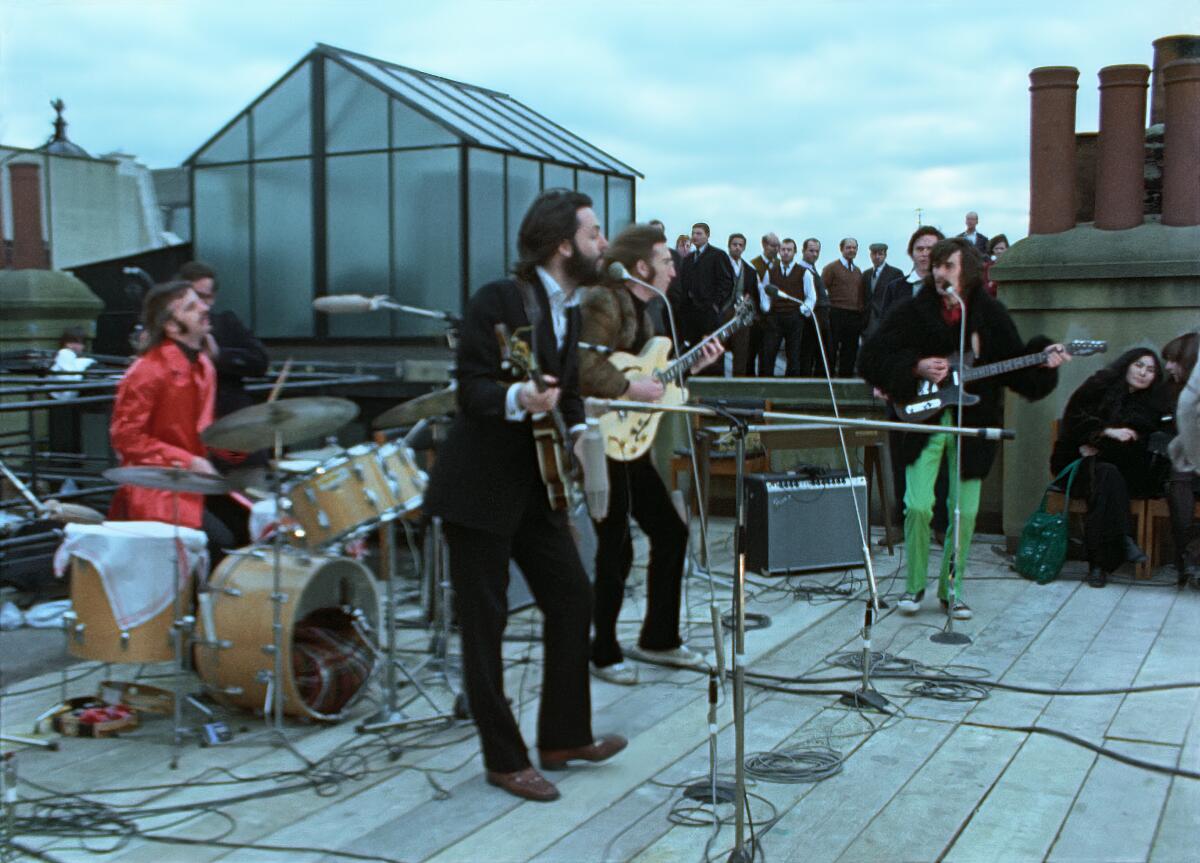Sign up for The Envelope
Get exclusive awards season news, in-depth interviews and columnist Glenn Whipp’s must-read analysis straight to your inbox.
You may occasionally receive promotional content from the Los Angeles Times.

Peter Jackson is quick to tell you he doesn’t have a favorite Beatle. Though he’s the soul of chatty cordiality in a call from his New Zealand headquarters, one senses that he finds the teen-magazine question has a whiff of impropriety to it: “I’ve always loved the Beatles as a group. You take any one member away and it’s not the Beatles anymore. I have to say, I love the Beatles because I love the music; I love the songs.”
There can be no doubt that Jackson, after his intensive review of 130 hours of audio and 57 hours of long-hidden video of the band at their career hinge point of January 1969, has no non-Beatle equal in knowledge of the group. If he has a humble brag it’s his, “I have no criticizing of the Beatles in my DNA,” but he’s no mere fan boy. His three-part, six-plus-hours “The Beatles: Get Back” documentary series on Disney+ is as unvarnished and all-inclusive as he could make it.
He’s also proud to bring us along as the Fab Four cliches are upended. Thus, John Lennon, the supposed bitter genius, emerges as the giddiest of the four, as well as the gentle George Harrison whisperer; Paul McCartney, the cute one, is not just preternaturally talented but the steady driving wheel; Harrison the mystic is actually the most practical-minded; and Ringo Starr is not just the shaggy trot-along but a master at finding a drum pulse for every new songwriting foray.
That these perspectives are available to us all is largely thanks to the brain trust at the Beatles-founded Apple Corps choosing Jackson to direct the project. It’s not only his place in the front rank of the art form — thanks to bringing his storied technological expertise to the epochal “Lord of the Rings” and “Hobbit” trilogies. Equally key in his filmography is his painstakingly restored, deeply humane 2019 World War I documentary, “They Shall Not Grow Old.” (He sees the Great War’s abrupt and almost meaningless end reflected in Ukraine today: “What’s the point of it all? When that moment comes in Ukraine, what has been achieved?”)

Jackson the ride-or-die Beatles man will still marvel that he missed the group’s early impact. Born in 1961 when the likeliest LP to be heard in his parents’ sedate New Zealand home might be the “South Pacific” soundtrack, in 1973 he scraped up the cash to buy the Beatles’ career-spanning Red (1962-66) and Blue (1967-70) collections and never looked back — until, of course, the monumental assignment he dove into in January 2019 with “Get Back.”
When Apple turned him loose in their archive and the treasures stashed since director Michael Lindsay-Hogg had shot the downbeat 1970 documentary “Let It Be,” he found the 16 mm footage was “grainy and desaturated” and the sound from the film crew’s mono tape recorders often murky, with a number of intimate Beatles debates obscured by the players’ purposely noisy strumming. Lindsay-Hogg had been forbidden to include the now-legendary moment of George Harrison’s oddly casual, “I’m leaving the band now,” and the footage was shelved, largely unseen in public.
Peter Jackson’s nearly eight-hour Beatles doc both refutes the canard of Yoko as band-wrecker and reminds us of what was lost when Paul and John went separate ways.
“When I started working on this project with Apple,” recalls Jackson, “it was the next movie after [2016’s Ron Howard doc of 1963-66 ‘touring years’] ‘Eight Days a Week.’ We were working towards a running time of two to 2 1/2 hours.” But by early 2020, even as Jackson was straining toward a wholesale cut, “I was aware it was going to be painful — ‘Boy, the amount of great stuff that people are not going to see — and that’s going back in the archives for 50 more years?’ Then the pandemic happened.”
Cloistered in a “lockdown bubble” with his longtime editor Jabez Olssen in New Zealand, Jackson rather boldy told Apple, ”We just don’t think 2 1/2 hours is a good idea — have a look at the [longer cut] and see what you think. And they said `Yeah, we agree.’” (The DVD will be out July 12.)
The 16-mm material was rejiggered, thanks to Jackson’s tech team, into vibrant color and sharpness. Even more crucially, with just eight months left until the release date of Thanksgiving 2021, and the original sound boosted for a coming remix, came the final stroke that would make the end product revelatory — applying a sophisticated artificial intelligence algorithm using machine learning, dubbed Mal, after the ever-helpful Beatles’ road manager Mal Evans, who appears throughout the “Get Back Sessions” footage. Mal could isolate audio, splitting off chatter from guitar strumming, mutters from buzzing amps and, for example, McCartney’s lead vocal as isolated from octave-spanning harmonies by Lennon and Harrison. (In encores on his recent concert tour, McCartney movingly puts up video from the rooftop “Let It Be” concert of Lennon joining in on “I’ve Got a Feeling” to create a duet of sorts.)

Having begun the project by interviewing such participants as engineer-producer Glyn Johns, Jackson adopted not only Johns’ wisdom that the real Beatles magic lay not in the guitars, etc., but in the harmonies. Also, by contrast to “All these books that have come out, painting this picture of the sessions as grim and depressing,” Johns described the actual joy involved. In fact, Johns told Jackson, he was laughing all day: “It was full collaboration of all four guys, regardless of who wrote the song.”
If the release of the doc series created a steadily-growing groundswell of enthusiasm, Jackson has not been shy in touting the idea of still more: “My real dream would be to do a more extended version. This is just me talking because Apple aren’t really interested to do that. I think they’re wrong.”
Some viewers found Lindsay-Hogg, with his talk of shooting a live Beatles show in Libya, obtuse. But not only does Jackson feel grateful to deploy his fellow director as a character, he celebrates his predecessor’s earnest querying, clever dodges (planting secret microphones, rolling film on the sly) and dogged attentiveness: “I love Michael. I adore his attempts to herd the cats. In the film, he’s a storyline — there are lots of storylines, with the songwriting, George leaving, all that but the storyline of Michael trying to make this movie is the one that I really relate to.”
Sign up for The Envelope
Get exclusive awards season news, in-depth interviews and columnist Glenn Whipp’s must-read analysis straight to your inbox.
You may occasionally receive promotional content from the Los Angeles Times.